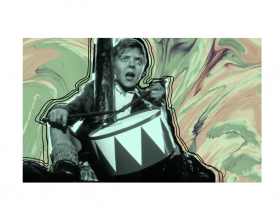Super Rich Kids is a self-contained tale of the last day in the life of a spoiled teenager. He wakesup on the roof, talks candidly about his wealth, drug-use and distant parents and then, in the evening, drunkenly slips and falls off the same roof. Steeped in triviality, Frank Ocean’s somber glance at ‘the one percent’ comes as a midway track on his 2012 debut studio album Channel Orange. The self-contained nature of the track is indicative of the wider album in that, to Ocean, ‘it’s about the stories.’ Like a 21st century Aesop, Ocean uses these stories to touch on moral issues and often give verdicts on classic themes such as wealth, love and family but always with a contemporary spin.
The track opens with a thumping piano line strongly reminiscent of Elton John’s ‘Bennie and the Jets’. Just one of a number of musical head-nods, this piano beat hits once a second and immediately gives the track a sense of constant triviality as it thumps on and on and on. The feeling is only heightened when Frank’s monotone vocals enter after a few bars. This is all an effect to set the tone for this story that Frank wants to tell; as he said, his aim is to “get the environment of music to best envelope the story.” Monotony and triviality define the lives ofthese rich kids, for they get everything they want, therefore rendering everything effectively valueless. Robbed of meaning outside the material, their lives have become a stupor of excess where nothing is enough anymore; “a million one, a million two, a hundred more will never do.”
However, within this story, Frank isn’t just commenting on the lives of these kids, but also on anAmerica emerging from the financial crisis. The financial crash of 2008 shook the entire world, and had a profound effect on American society. It costed millions of ordinary Americans jobs, homes and savings through despite no real fault of their own. Through economic turns of phrase such as “the market’s down like 60 stories,” Frank is able to use his character’s literal fall as a metaphor for America’s economic crisis. This comparison is clearly an effort to explain how a society’s ‘one percent’, consumed by greed and status, could have been leading that society into such an inevitable disaster. It is certainly a damning indictment on those Frank finds responsible that, despite being the cause of his own downfall, all the kid can think to do is “close my eyes and feel the crash.”
Returning to the original story, perhaps the most important aspect to Frank’s view on these kids is that he is sympathetic. Frank doesn’t particularly blame them for their behavior but sees it asa consequence of emotional neglect by their absent parents; “the maids come around too much, parents ain’t around enough.” The only emotional voice in the track comes in Frank’s use of lyrics from Mary J Blige’s ‘Real Love’ as the kid despairs at how he is “searching for a real love.” Having explained this emotional void, it is easy to see why they try to fill it by acting out and indulging in drug and alcohol-fueled escapism. In fellow Odd Future member Earl Sweatshirt’s featured verse, this frustration manifests itself in anger and destructive behavior as the kid he describes takes it out on his father’s possessions; “he mad, he snatched his daddy’s Jag”, and used that shit for batting practice.” By the end of the track these spoiled brats are actually quite piteous figures who, having grown up in a loveless environment, become a depressing gang of bitter adolescents.
The reason why Frank takes such a sympathetic view can, to some extent, be explained by whatwe know of who he is as a person. Famously private, we only really get snippets of who he really is. One side to Frank which is revealed through the cover of his mixtape Nostalgia Ultra, and countless other references in his songs, is that he loves sports cars and clothes. This is more revealing than it may seem as, knowing the appeal of wealth all too well, by putting himself in this kid’s designer shoes, Frank has the self-awareness to realize that he would very likely have become the same thing. Frank also understands that wealth and status won’t solve real, deep-seated personal issues and therefore knows that, without the right environment, there is no chance of redemption for this kid. This is why when the kid asks “do they sew wings on tailored suits?” Frank’s answer is a definitive no.
The heart of Frank’s message is that money can make good people do terrible things and that is why we’re constantly reminded that these aren’t monsters; they’re kids.




